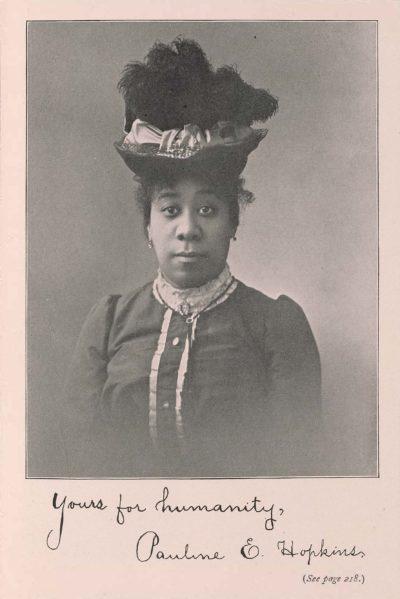Pauline Elizabeth Hopkins, ca. 1901

Portrait of American author Pauline Elizabeth Hopkins featured in The Colored American Magazine, Vol. 3 No.1 (May 1901) over the caption: "A Leading Race Author and Regular Contributor to our Magazine."
Born into an educated free black family in Portland, Maine, Pauline Elizabeth Hopkins (1859-1930) was a playwright, journalist, novelist, historian, editor, feminist, public intellectual, supporter of the arts, and an outspoken crusader for African American rights. She is considered a pioneer in her use of the romantic novel to explore social and racial themes and is best known for her 1900 novel Contending Forces: A Romance of Negro Life North and South.
According to the Colored American Magazine, Hopkins was its most prolific contributor, serving in various editorial capacities during the publication's first four years, from 1901 to 1904, including as editor of the Women’s Department, literary editor, and eventually editor-in-chief (“editress”). Hopkins later wrote for the Voice of the Negro and co-founded the short lived New Era Magazine.
Her battles with Booker T. Washington ultimately led to her professional demise as a journalist. In 1918, she became a stenographer at MIT, where she worked for the rest of her life. In 1930, after her death in Cambridge, Massachusetts from burns sustained in a house fire, W.E.B. DuBois offered his "long overdue public acknowledgement of her career," according to Hopkins biographer Lois Brown. "He did not pay tribute to Hopkins the author, playwright, historian and race woman. He instead declared, quite distractingly, that she was a poetess, and also identified her as a married woman":
Mrs. Pauline Hopkins, 71, authoress and poetess, and a former stenographer at the Massachusetts Institute of Technology, died in Cambridge, Mass., in August.
The Crisis, Volume 37 Issue 10, October 1930, p. 344
In 1993, the Cambridge African American History Project honored Hopkins's literary legacy with a historic marker at 53 Clifton Street, where she once lived. "Even with these gaps in our knowledge, Hopkins remains one of the most prolific Black women writers of the early 1900s," write Alyssa Napier '16 and Michael Baick. "She embodied a bold reimagination of the American Dream, even if she struggled to achieve it in her own life."
Scholars have credited the lost civilization described in Hopkins's 1902-1903 novel Of One Blood, first serialized in The Colored American Magazine, as the inspiration for the setting of Wakanda in Marvel's Black Panther series. Parts of Black Panther 2: Wakanda Forever (2022) were filmed on the MIT campus.